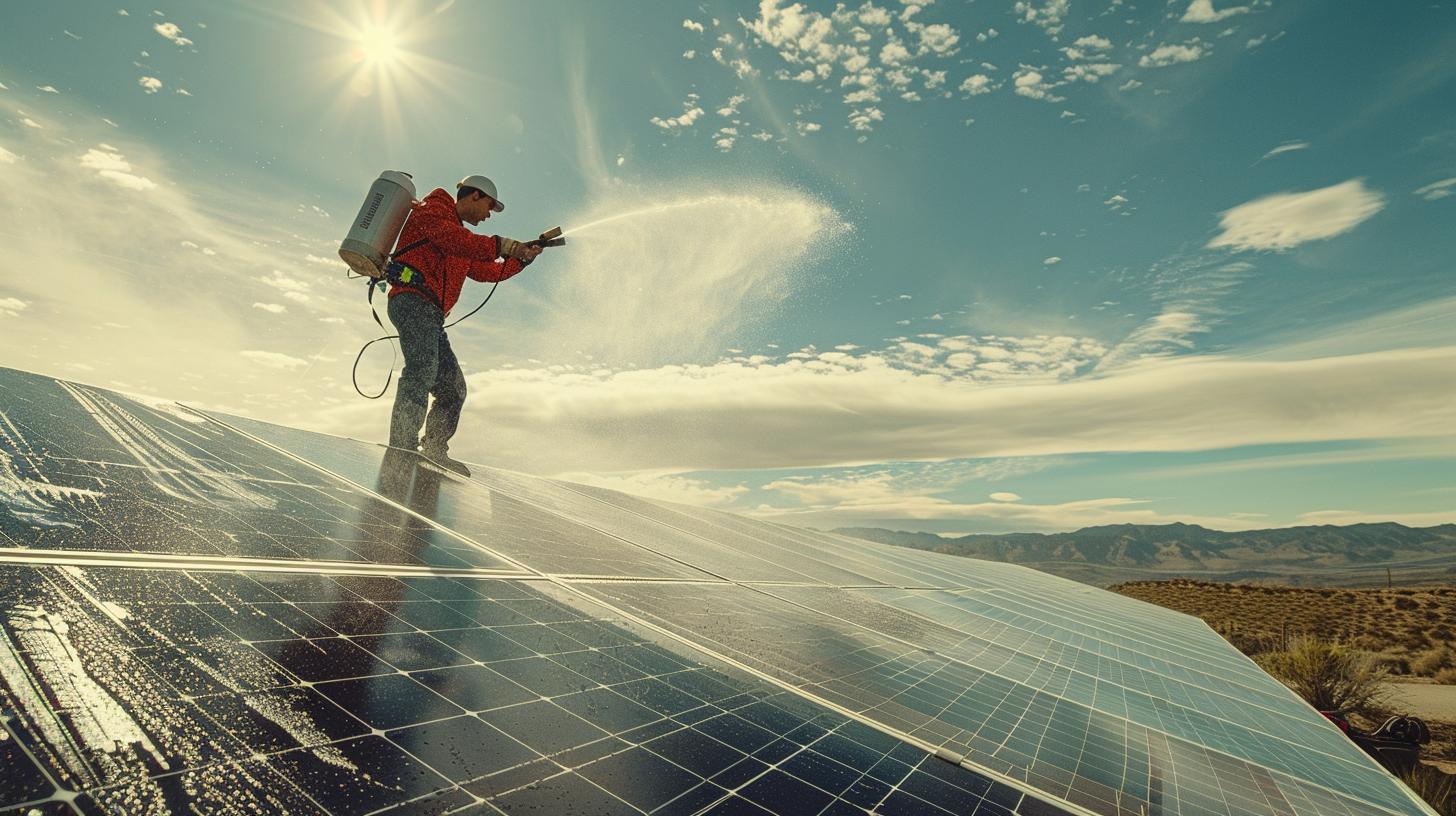Can You Clean Solar Panels With Windex: Surprising Truth for Best Efficiency
Ever wondered if you can clean solar panels with Windex?
It’s a common question that warrants a closer look…
After all, solar panels are a significant investment and keeping them clean is vital for optimal performance. But, cleaning them isn’t as straightforward as you might think.
Before you grab that bottle of Windex, it’s important to understand that most solar panel manufacturers advise against using soap-based cleaners. Why?
Cleaning solar panels with windex often leaves behind streaks, which can reflect sunlight and reduce your panels’ efficiency.
So, what’s the best way to clean your solar panels, and where does Windex fit into the equation? Let’s dive in and find out.
Key Takeaways
- Solar panel manufacturers advise against using soap-based cleaners like Windex, as these tend to leave streaks that can reflect sunlight and reduce the panels’ efficiency.
- Many solar panel owners turn to professional cleaning services every few years, typically using deionized water instead of soap-based cleaners.
- The use of a De-Ionized (DI) system, which includes a fiberglass extension pole and brush, is a common method favored by panel owners.
- Alternating your cleaning methods, such as using a deionized water system, can maintain your solar panels’ efficiency and prolong their productive life.
- Other liquid cleaners, like a mixture of vinegar and water or mild, biodegradable soap like Dawn, can also be effective for cleaning solar panels without leaving any residue.
- Regularly cleaning your solar panels is important for maintaining their efficiency, as dirt and debris buildup can decrease light absorption and lead to performance dips of as much as 25% or even 50% in severe cases.
Answered: Does Windex Damage Solar Panels
Many solar panel owners wonder if using Windex to clean them is a good idea. This question comes up quite often due to the common use of Windex in cleaning traditional glass surfaces. However, it’s important to remember that the materials used in creating solar panels differ significantly from standard windows.
Solar panel manufacturers usually recommend against using soap-based cleaners such as Windex. Why’s that? Well, these types of cleaners have a propensity to leave streaks on the panels. Streaks may appear harmless, but they can actually reduce your panels’ efficiency by reflecting sunlight, instead of allowing it to be absorbed effectively.
Anecdotal evidence from solar panel users supports this stance. For example, many users resort to professional cleaning services every few years. Nearly all these professionals avoid using soap-based cleaners and opt for deionized water instead.
Moreover, some find it effective to rinse their panels with a soft water line. Seasonal factors like Santa Ana wind season or fire incidents can affect the frequency of the cleaning. Impact from weather changes, dust, and ash build-up means you sometimes may need to clean your panels as often as every week.
The use of a De-Ionized (DI) system is a common method favored by panel owners. It typically includes a fibreglass extension pole and a brush, which can be an effective solution.
Every aspect of a solar panel, from the construction materials to the cleaning methods, aims to optimize efficiency and prolong service life. As such, it might be wise to stick with the manufacturer-recommended cleaning methods, bypassing soap-based cleaners such as Windex for alternatives like deionized water.
Paying heed to these effective cleaning methods sets the stage for solar panels to perform at peak efficiency. It’s not just about cleanliness, it’s about getting the most out of your investment in solar power. Continue following our guide on solar panel care for more insights on maintaining your solar power ecosystem.
Pros and Cons of Cleaning Solar Panels with Windex
There’s a fine balance to consider when we’re talking about cleaning solar panels with Windex. It’s not as clear-cut as you’d like it to be. Even with all its advantages like ease of use and accessibility, there are significant drawbacks to consider.
Sure, Windex is handy, affordable, and easy to use. Its availability in most households makes it a tempting choice for a quick clean-up. Swipe those panels clean and they’re back to power production at full throttle. Or are they? Here’s where you need to slow down and consider the repercussions.
Solar panel manufacturers consistently warn against using soap-based cleaning agents like Windex. Why? They’ve got a good reason. Soap-based cleaners tend to leave unholy streaks on the panels, not your everyday, visible streaks, but those annoying ones that mess with your panels’ efficiency. These streaks reflect sunlight away, bearing a direct impact on the power your panels can produce. Truth is, clean panels are efficient panels.
So, alternating your cleaning methods could save your solar panels’ productive life. Your best bet often could be a De-Ionized (DI) water system with a rinse. No soap, no streaks, just a clean, sunlight-absorbing surface. Some solar panel owners have turned this into a system, even hiring professionals that clean both windows and solar panels using deionized water.
| Method | Pros | Cons |
|---|---|---|
| Windex | Easy to use, affordable, commonly available | Leaves streaks, reduces efficiency |
| DI Water System | Avoids streaks, maintains efficiency | Possibly more effort, or higher cost |
But let’s not forget about the seasons. If you’re surrounded by the Santa Ana winds whipping up fires and dropping ash all summer, you’re likely cleaning much more frequently. This could make a DI water system more attractive, justifying the higher cost with increased efficiency.
Using Other Types of Liquid Cleaners on Solar Systems

We’re going in-depth about other liquid cleaners you might be considering for your solar panels. Let’s explore their effectiveness, precautions, and how they stack up against streaky culprits like Windex!
What is the Best Glass Cleaner for Solar Panels?
While glass cleaners like Windex are often thought of first, they’re not necessarily the best option for solar panels. Leave the Windex for the windows. For panels, you want something that’s not abrasive, doesn’t leave a residue, and is gentle on the material. Strangely enough, one of the top recommendations is windshield washer fluid. It’s designed to handle bird droppings – a familiar foe for solar panels – and other stubborn grime without damaging the surface or leaving streaks.
What is the Best Liquid to Clean Solar Panels with?
The best advice? Keep it simple with water and mild, biodegradable soap. The trick is in the technique. Avoid hard-bristle brushes and high-pressure hoses. Show patience using soft-bristle brushes and plastic blade squeegees attached to a long pole. This approach removes the loose dirt and grime without the risk of scratching or causing damage to the panels. And stick to cleaning panels during cooler parts of the day to prevent sudden temperature changes that can stress them.
Is Vinegar Good to Clean Solar Panels?
Powered predominantly by user recommendations, a mixture of vinegar and water has become a popular homemade solution for cleaning solar panels. Vinegar is an eco-friendly option, but do note that like all cleaners, it must be thoroughly rinsed off to avoid any residue which could affect panel performance.
Can I Use Dawn Soap to Clean My Solar Panels?
If you’re in the soap aisle, Dawn soap could serve you well as a solar panel cleaner. Not only is it effective – gentle enough to clean yet powerful against grime – but it’s also known for its biodegradability. Once again, proper and complete rinsing is important to ensure no soap residues remain that could hinder your solar power performance.
For a cleaning regimen that balances effectiveness, gentleness, and eco-friendliness, a simple combo of water and mild soap, possibly Dawn, checks all the boxes. Occasionally bring in a vinegar-water solution or windshield washer fluid for bigger messes. Pro tip? Avoid any temptation to use Windex and its streaky-goodness for your solar cleaning tasks. A better bet is to stick to tried-and-true methods and cleaner recommendations from your solar panel manufacturer.
Importance of Keeping Solar Panels Clean
So, you’ve invested in solar panels for their environmental benefits and cost savings – but is the cleaning regime an area you’re overlooking? It’s time to understand and appreciate the importance of keeping solar panels clean.
Impact of Dirt and Debris on Solar Panel Efficiency
Since solar panels rely on light absorption to generate energy, anything that obstructs this process can affect their performance. Dust, bird droppings, leaves and debris, or even snow can accumulate on your solar panels over time and can impair your panels’ ability to absorb light.
This isn’t just an aesthetic issue. Solar panels covered with grime and dirt can experience performance dips of as much as 25%. In some severe cases, where panels become completely obscured, the loss in efficiency can reach a staggering 50%. These are potential figures – actual losses may vary based on how much dirt accumulates and the local environmental conditions.
Benefits of Regular Panel Washing
This is where the importance of a regular panel washing regimen comes into play. It may seem like a hassle but maintaining your solar panels in a clean condition can significantly boost their efficiency.
Anecdotal evidence from homeowners suggests that a well-executed clean can lead to an improvement in output of approximately 10%, depending on how dirty the panels were prior to the clean.
Experiment with different cleaning methods to see what works best for your panels. A gentle hose-down mimicking a heavy rain might be sufficient in some cases. Others may require a bit more of a hand-on approach with a specialized cleaning kit. However, remember the golden rule: Always avoid abrasive materials to prevent scratching and damaging the panel surfaces.
Cleaning your solar panels can indeed be a DIY task – as long as you remember to accord higher priority to your safety.
In the next section, you’ll explore some of the debate over using Windex on solar panels…
Best Practices for Cleaning Solar Panels
So, you’ve learned that keeping your solar panels clean can significantly boost their efficiency. You’ve also learned that the wrong cleaning method can do more harm than good. But what about Windex? While it’s a common household cleaner, it’s not necessarily the best choice for your solar panels. It’s important to avoid abrasive materials and harsh chemicals that could damage your panels. Instead, opt for gentle, eco-friendly solutions and soft cleaning tools. Remember, safety is key when you’re cleaning your panels, especially if they’re on your roof. Regular maintenance is key to keeping your solar power system running at its best. So, get out there and start cleaning—but do it the right way.
